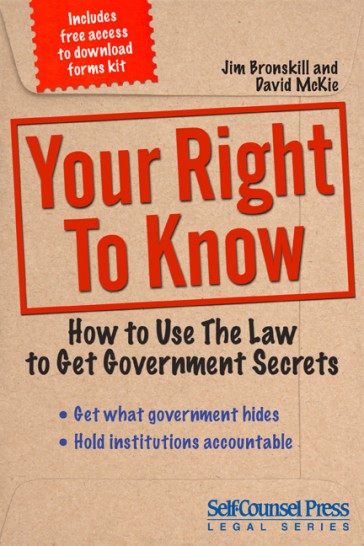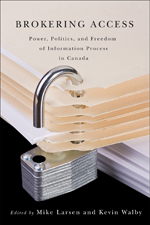Canada’s Access To Information Act – Online Database
Your ticket to searching
requests made under
Canada’s Access to
Information Law
Digging Deeper Deeper, Third Edition, Oxford University Press. Order it at Amazon.ca.
Third Edition, Oxford University Press. Order it at Amazon.ca.
A comprehensive guide to
investigative journalism, research techniques,
Digging Deeper also contains a chapter on
using access-to-information and freedom-of-information.
Your Right To Know:How to Use the Law to Get Government Secrets
Brokering Access: Power, Politics, and Freedom of Information Process in Canada
David
McKie, CBC News
Phone: (O)
288-6523 (C) 290-7380
David McKie is an author (see two of his co-authored books at the top of this page), part-time, journalism instructor, and award-winning producer in CBC New’s Parliamentary Bureau.
David files access-to-information requests almost every day.
He teaches data-journalism reporting and research
methods at Carleton University’s school of
journalism, and the University of King’s College in Halifax during the summers.
You’ll find his research techniques
syllabus at: http://www.davidmckie.com and learn more about his background by checking out his cv.
Now, a word about this page. It is an old database that was originally created and maintained by access-to-information expert Allasdair Roberts, from whom I assumed responsibility when he moved from Queens University in Kingston, Ontario, to continue his academic career in the United States.
The information for this website ended in 2008, when the former Conservative government under Stephen Harper decided to discontinue it for reasons many advocates, including the federal information commissioner at the time, struggled to understand.
Since then, federal departments, Crown corporations and agencies have begun uploading summaries of their requests online, as part of a broader open-data initiative. However, the federal department responsible for administering the Act, the Treasury Board Secretariat of Canada, seems to be now only posting two years’ worth of summaries, the latest being for the years 2015 and 2016.
Previous downloads from the website provide summaries back to 2014.
Needless to say, there’s is a gap in the summaries that are available. Still, on this website you’ll be able to search summaries, dating back to the early nineties.
Once it has been updated, you’ll be able to use the search engine to peruse all the all the text files containing the monthly summaries simultaneously. For the time being, you can search the individual text files by clicking on the links, and using the control-F function on your keypad (for PC-users) to conduct word searches.
When the search engine is operational, I’ll let you know. For the time being, this should get you going.
Search a database of requests
submitted under Canada’s Access to Information
Act
This
page allows you to search a database of requests
for information filed with departments and
agencies of the Canadian government under Canada’s
Access to Information Act You can use this
database to identify requests that relate to your
own research interests. Next, you can contact
departments and agencies to obtain records already
made public in response to those requests.
To
use the database, follow the instructions provided
below. If you experience difficulties, please
contact David
McKie.
Where does this
data come from? [Top]
The
information in this database was entered by
federal institutions into the Coordination of
Access to Information Requests System (CAIRS), a
software program maintained by the Department of
Public Works and Government Services.
Monthly
reports from the CAIRS database are obtained from
Treasury Board Secretariat, another agency of the
Canadian government, by Access to Information Act
requests.
How to use this
database [Top]
Enter keywords relating to your research into the search
engine (below). The search engine will retrieve
pages that contain your keywords. Each page
consists of a monthly report generated by the
CAIRS database. Click on each retrieved page and
repeat your search using your browser’s search
feature. Some monthly reports are large and load
slowly.
When you’ve located a relevant request, note the
institutional code and the file number. Use the table
of institutional codes at the back of this
document to identify the institution that
received the request.
Use this directory of departmental
ATIA coordinators to find contact information
for that institution.
Contact the coordinator’s office to ask whether records
have been released in response to that request. If
so, make a written request for a copy of “all
records reviewed” for that earlier request. (The
wording is important: this clarifies your right to
appeal with regard to the use of exemptions or
exclusions.) You will be asked to pay a five
dollar application fee, and possibly a charge for
photocopying the records.
Limitations of the database
[Top]
The Harper government no longer maintains a CAIRS
system. So this database only goes to Oct. 2008.
The Information Commissioner’s Office is attempting
to either convince the government to revise the
system, or devise another method of making this
kind of information more accessible. Given the
limitations of this database, it is still a valuable
resource for records dating back several years.
Some large departments did not enter all requests which
they have received into CAIRS. Consequently you
should not assume that this is a comprehensive
list of federal ATIA requests. And when CAIRS
was in operation, several government institutions,
including Crown corporations such as the CBC,
were exempt from the Access to Information Law.
Search this
database
[Top]
News about this
database [Top]
April
2001: The Canadian government releases documents
that explain the public access features of
its new CAIRSWeb software. The public access features
have not been activated.
May
2003: On
May 1, 2003, Privacy Commissioner George Radwanski
provided a letter summarizing his investigation
regarding the distribution of personal information
through the CAIRS database. His
letter can be downloaded here.
December 16, 2003: Treasury Board
Secretariat issues an information
notice to government departments to clarify
their obligations under the Official Languages Act
with respect to ATIA requests entered into the
CAIR System.
July 30, 2004: Treasury Board
Secretariat stops issuing monthly CAIRS reports as
searchable text files. A complaint has been made
to the Information Commissioner of Canada.
August 25, 2004: On August 23, Treasury
Board Secretariat reversed its July 30 decision
and resumed providing CAIRS data in usable
electronic form.
October 6, 2004: The Information Commissioner
rules that Treasury Board Secretariat should
provide direct public access to the CAIRS database.
Treasury Board Secretariat refuses to comply
with the decision. Read
the excerpt from the Commissioner’s Annual Report.
October 31, 2004. Research note on Treasury
Board Secretariat survey of federal institutions’
views of the Coordination of Access to Requests
System. Results show that compliance with
CAIRS requirements is spotty; few institutions
use CAIRS’ search functions frequently; only
half of major institutions regard CAIRS as a
“necessary tool” for their organization.
May 2, 2008. Tories
decide to kill CAIRS database
Access
monthly reports directly [Top]
January 2005
February 2005
March 2005
April 2005
May 2005
June 2005
July 2005
August 2005
September 2005
October 2005
November 2005
December 2005
January 2006
February 2006
March 2006
April 2006
May 2006
June 2006
July 2006
August 2006
September 2006
October 2006
November 2006
December 2006
Amberlight Monitor [Top]
ATIA requests submitted by journalists and
Members of Parliament are usually tagged by
federal agencies for special attention, which
often causes added delay in the processing of
requests. (To learn more, read
this paper, “Spin Control and
Freedom of Information.”) In some agencies,
these requests are said to be “amberlighted.” The
following reports identify media and parliamentary
requests logged in CAIRS each month.
ACCESS in the
news[Top]
Canada
Oct. 13, 2010
The information commissioner gives many federal
government departments a failing grade.
http://www.cbc.ca/politics/story/2010/04/13/information-requests.html
Foreign
Freedom
of information in the United Kingdom
A Supreme Court of Canada decision pours cold
water on the solicitor-client privilege exemption.
Read about the decision in the Law
Times.
On Sept. 23, 2006, the Canadian Newspaper
Association once again concluded that governments
across the country have a long way to go to
improve open access to material that should be a
matter of public record. For more news about the
audit, please visit the CNA’s website.
The Right to Know Coalition of Nova Scotia has
launched its website: http://www.nsrighttoknow.ca/
Access
research[Top]
Darcy-Anne Wintonyk’s master’s project on Transport
Canada and the effect that the 2001 terrorist
attacks on the United States had on the department’s
responses to journalists filing freedom-of-information
requests caused quite a stir. In the Spring 2006
edition of Media
magazine (which also has an excellent primer
by the Ottawa Citizen’s David Pugliese
on how to use the Access to Information Act with
a degree of success), Darcy outlined the problems
she encountered attempting to carry out her study
in order to complete her masters of journalism
degree at the University of British Columbia’s
Masters of Journalism program. You can read the
study by clicking here.
If you want to contact Darcy, you can reach her
at: darcyanne@gmail.com



